Cats are known for their playful, sometimes hyperactive behavior. But when that energy becomes too intense, it can be a challenge for cat owners to manage. Knowing how to soothe a hyperactive cat is crucial for creating a harmonious living environment and ensuring the well-being of your beloved feline friend. This guide provides tips and insights into cat behavior and offers practical advice on how to handle, soothe, and calm a hyperactive cat.
Ways of Calming Down a Hyperactive Cat
Plan Play Sessions
Creating structured play sessions can be a highly effective strategy for managing the boundless energy of a hyperactive cat. It’s important to incorporate regular, scheduled playtime into your cat’s daily routine. Use toys that stimulate the cat’s natural hunting instincts — such as toy mice or feather wands. Engage in interactive play for about 15 minutes, ideally just before meals. This not only allows your cat to expend energy but also taps into their instinctual need to hunt and feed, which could result in them enjoying a more restful sleep afterward. Remember, the goal is not to exhaust your cat but to provide a balanced amount of physical activity and mental stimulation. Consistency is key, and over time, your cat may become calmer and less hyperactive.
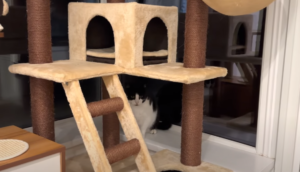
Schedule Proper Mealtimes
Regulating your cat’s mealtimes can greatly influence their behavior. Cats are creatures of habit, and establishing a routine can help manage their energy levels. Establish a consistent feeding schedule for your cat, ensuring that you adhere to it without deviation. If your cat knows when to expect meals, they are less likely to exhibit hyperactive behavior out of hunger or anticipation for food. High-quality, protein-rich meals can also keep your cat healthy and satisfied, reducing erratic energy bursts. Remember, a well-fed cat is a happy cat, and a set mealtime routine can contribute significantly towards calming a hyperactive cat. [1]
Check for Hyperthyroid Issues
Hyperthyroidism can be a cause of hyperactive behavior in cats, particularly in older felines. This condition is marked by an overactive thyroid gland, leading to an increase in metabolism and, often, restlessness or hyperactivity. Symptoms may manifest as swift weight loss, heightened appetite, excessive thirst and urination, vomiting, and frequent vocalization. If your cat exhibits any of these symptoms, particularly if they’re older, it’s crucial to consult with a veterinarian. Blood tests can confirm whether hyperthyroidism is the cause of your cat’s hyperactivity. If diagnosed, your vet can provide suitable treatment options, including medication, dietary changes, or surgical intervention. Gaining insight into the underlying cause of your cat’s behavior is an essential aspect of addressing their hyperactivity and promoting their overall health and well-being.
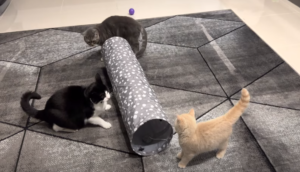
Give Your Cat Its Space
Ensuring your cat has its own space is another effective strategy for calming a hyperactive cat. Cats are naturally territorial and having a safe, quiet space where they can retreat to can often help them calm down. This space could be a cozy corner with a comfortable bed, a window perch, or even a secluded spot high on a cat tree. Adding items like soft blankets, catnip toys, or calming pet diffusers can further enhance this space and provide additional comfort for your cat. It’s also important to respect your cat’s personal space. If they retreat to their spot, let them be. Encroaching on their territory can lead to anxiety and increased hyperactivity. Keep in mind that every individual requires a sanctuary, and for your feline friend, it may serve as a tranquil oasis to find solace. [2]
Clean Dirty Litter Box
A soiled litter box can contribute to heightened anxiety and hyperactivity in feline companions. Cats are notably clean animals and a filthy litter box can be distressing for them, prompting erratic behavior. To avoid this, make sure to clean the litter box at least once daily. Dispose of the soiled litter, cleanse the litter box using mild soap, and replenish it with fresh litter. If possible, consider having more than one litter box in your home, especially if you have multiple cats. Maintaining a clean environment for your cat to answer nature’s call can significantly contribute to reducing their hyperactive behavior. Moreover, it promotes better hygiene and health for your feline companion. Keep in mind that cleanliness plays a vital role in a cat’s life. By ensuring a clean litter box, you can create a serene and joyful living environment for your feline companion.
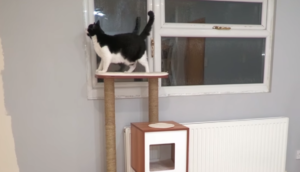
What is “Zoomies?”
“Zoomies” is a commonly used term among pet owners to depict spontaneous surges of energy and playful antics exhibited by animals, particularly cats. The technical term for this behavior is FRAPs (Frenetic Random Activity Periods). During a playful episode known as “zoomies,” your cat may exhibit bursts of energy, dashing around the house, chasing its tail, or engaging in other hyperactive behaviors. This is a normal part of a cat’s behavior, allowing them to burn off excess energy. Typically, “zoomies” last for a few minutes and are often followed by a period of rest or sleep as the cat recovers from this energy expenditure.
[3]What Is the Behaviour of a Hyperactive Cat?
A hyperactive cat often exhibits behaviors such as excessive playfulness, restlessness, and high levels of energy. These cats may dart around the house at high speeds, jump on furniture, and engage in other high-energy behaviors. You may notice that they have a hard time settling down, even during times when they would typically be resting or sleeping. Hyperactivity can also manifest as excessive vocalization, with your cat meowing or yowling excessively, often for no apparent reason. Your cat might also show signs of increased aggression, such as biting or scratching more than usual. Remember that a sudden change in behavior or an extreme level of hyperactivity may indicate a health concern, so it’s crucial to consult with a veterinarian if you notice these behaviors in your cat.
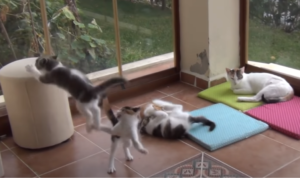
Why Do Cats Become Hyperactive?
The factors contributing to hyperactivity in cats are diverse and can be influenced by individual characteristics, including age, health, and environment. For younger felines, hyperactivity is typically a result of their natural playfulness and curiosity. They have a lot of energy to burn and exploring their environment is a part of their learning process. However, in older cats, sudden hyperactivity could potentially indicate a health issue, such as hyperthyroidism, as mentioned earlier.
Environmental factors can also contribute to hyperactivity. An environment that is too stimulating or not stimulating enough can result in hyperactive behavior. For instance, too many noises or activities around the house may over-stimulate your cat, causing them to become hyperactive. Conversely, a lack of stimulation can make them restless, manifesting in hyperactivity as they seek ways to entertain themselves.
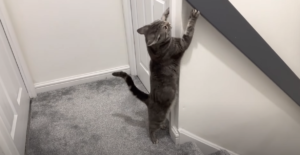
Diet can also influence a cat’s behavior. Feeding your cat food that is high in carbohydrates and sugars can cause energy spikes, leading to hyperactivity. Inconsistent feeding times can also result in behavioral changes, as cats are creatures of routine.
Finally, stress or anxiety can lead to hyperactivity in cats. Similar to humans, cats can display signs of restlessness and erratic behavior when they feel anxious or stressed. This can be triggered by changes in their environment, such as moving house, introducing a new pet or family member, or changes in their routine. [4]
How to Understand the Mood of a Hyper Cat?
Understanding the mood of a hyperactive cat often involves observing their body language closely. When your cat is in a playful, high-energy mood, they may exhibit behaviors such as darting around, chasing their own tail, or jumping on furniture. Their pupils might be dilated, their ears pricked forward, and their tail may twitch or wag.
On the other hand, if your hyperactive cat is showing signs of stress or anxiety, the indicators might be different. They may exhibit excessive grooming, hide, or even show aggression by hissing or swatting. Their ears might be flattened, pupils dilated, and the tail may be tucked underneath the body or puffed up.
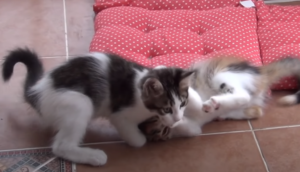
A change in their eating habits, litter box usage, or vocalization can also provide insight into their mood. If you notice a sudden change in behavior or increased hyperactivity in your cat, it’s crucial to consult with a veterinarian, as this may be indications of underlying health issues.
Remember, spending time with your pet and observing their behavior can help you understand their moods better, enabling you to address their needs more effectively.
When to See a Veterinarian?
While occasional hyperactivity in cats can be part of their normal behavior, it’s crucial to consult a veterinarian if you notice sudden changes in your cat’s behavior or extreme levels of hyperactivity. Behavior changes that warrant a vet visit include excessive vocalization, aggression, changes in eating habits, alterations in litter box usage, or signs of anxiety such as excessive grooming or hiding. Moreover, in older cats, a sudden increase in activity levels could indicate underlying health issues such as hyperthyroidism. Additionally, if your efforts to calm your cat’s hyperactive behaviors are unfruitful or if they seem to be causing your cat distress, it’s important to seek professional help. Remember, the health and well-being of your feline friend is paramount, and a veterinarian can provide valuable advice and treatment options to manage hyperactivity in your cat. [5]
FAQ
Why is my cat extremely hyper?
Your cat can be extremely hyper for various reasons. It’s common for young cats and kittens, who have a high energy level and natural curiosity, to exhibit hyperactive behavior. In this phase of their life, they are learning about their environment and discovering their hunting skills, which can result in bouts of intense activity. However, if you own an older cat, sudden hyperactivity could signify a medical condition, such as hyperthyroidism, which should be evaluated by a veterinarian. Environmental factors can also play a role. A cat may react to a stimulating or stressful environment by becoming hyperactive. Lastly, dietary factors, such as high carbohydrate intake, can cause energy peaks and result in hyperactivity. If your cat’s extreme hyperactivity is causing concern, disrupting the household, or they show any signs of distress, it’s advisable to consult with a veterinarian.
Will my hyper cat ever calm down?
Yes, your hyper cat can calm down. While kittens and young cats are generally more hyperactive due to their playful nature, they usually begin to calm down as they age and mature. Adult cats tend to be more relaxed and less energetic than their younger counterparts. However, remember that each cat is unique and the timing of this calming stage can vary from cat to cat. The environment, health status, and individual personality of your cat can all influence their activity levels. If your senior cat is exhibiting sudden hyperactivity or if their excessive energy is causing distress, it is crucial to seek advice from a veterinarian. It’s also worth noting that providing an enriching, balanced environment and maintaining consistent routines can help manage your cat’s hyperactivity.
What calms a crazy cat?
There are several strategies you can adopt to calm a hyperactive or ‘crazy’ cat. Regular exercise and interactive playtime can help to expend their energy effectively and reduce hyperactivity. Providing toys, scratching posts, and climbing trees can also keep them occupied and mentally stimulated. Consistent feeding routines with a balanced diet can help regulate energy levels. Limit the intake of foods high in carbohydrates and sugars to prevent energy spikes. Environmental enrichment, such as access to window views of the outdoors or puzzle feeders, can also help to keep them entertained and relaxed. Introducing calming stimuli, such as catnip, pheromone sprays, or calming music can also help to soothe a hyperactive cat. If the hyperactivity persists or causes distress, it may be best to consult with a veterinarian for further advice or treatment options.
Does my cat have ADHD?
Although Attention Deficit Hyperactivity Disorder (ADHD) is a condition that is diagnosed in humans, it is not recognized as a condition in cats. If your cat seems hyperactive, unable to focus, or exhibits rapid shifts in behavior, it may be due to high energy levels, boredom, stress, or other environmental factors. However, it’s also important to note that certain medical conditions, such as hyperthyroidism, can cause similar symptoms. It is advisable to consult a veterinarian if your cat’s behavior is causing concern. They are capable of conducting a comprehensive examination to eliminate any possible health concerns and can also provide valuable guidance on effectively managing your cat’s behavior.
How do I get my cat’s energy out?
To get your cat’s energy out, engaging them in interactive play sessions is key. Use toys that mimic their natural prey like birds, mice, or insects to stimulate their hunting instincts. Laser pointers, feather wands, or even a simple string can keep them busy. Regular play sessions will not only help drain their excess energy but will also strengthen your bond with them. Including climbing trees or scratching posts can enhance both physical exercise and mental stimulation for cats. Remember to adjust the intensity and duration of playtime according to your cat’s age and health status. If your cat continues to exhibit hyperactive behavior despite regular play and a stimulating environment, it might be advisable to take them to the veterinarian to rule out any potential underlying health issues.
Why is my cat acting hyper and crazy?
Your cat may act hyper and crazy due to numerous reasons. It could be a result of pent-up energy, especially if your cat is young or doesn’t get enough exercise. Their seemingly “crazy” behavior may stem from their innate predatory instincts and playful nature. Environmental changes, such as the introduction of a new pet or person into the household, can also trigger hyperactivity in cats as a result of stress or excitement. Additionally, certain foods or substances, like catnip, can cause temporary hyperactivity. It’s also possible that a medical issue such as hyperthyroidism or a cognitive disorder could cause sudden behavior changes. If your cat’s hyperactive behavior worries you, consult a veterinarian to rule out health problems and get guidance on managing their behavior.
What age are cats most hyper?
Cats are typically most hyper during their kittenhood and young adult phase, which is approximately between the ages of 2 months to 2 years. This is a time when they are most active, playful, and curious, exploring their surroundings and honing their hunting skills. However, the level of hyperactivity can vary greatly from cat to cat, and factors such as breed, health status, and environment can also influence their energy levels. As cats age and mature into adulthood, they generally tend to mellow and their activity levels decrease. However, sudden hyperactivity in older cats can sometimes indicate a medical condition, like hyperthyroidism, and should warrant a visit to the veterinarian. Overall, it’s important to monitor your cat’s behavior and consult with a vet if their hyperactivity becomes excessive or causes concern. With proper care, attention, and management, your hyper cat can learn to calm down and lead a happy and healthy life.
Why is my cat never calm?
If your cat never seems to calm down, it could be due to a variety of factors. Breeds with high energy levels and younger cats tend to be naturally more active and may exhibit hyperactive behavior, particularly during their playful and energetic “zoomies” periods. A lack of mental stimulation or physical exercise can also lead to pent-up energy, causing your cat to be constantly restless. Changes in surroundings, stress, or anxiety can also result in increased activity or agitation. Diet plays a role too – feeding them food high in carbohydrates can lead to energy spurts. If you’ve considered these factors and your cat remains hyper, consult a veterinarian. Certain medical conditions, such as hyperthyroidism, can cause hyperactivity and restlessness in cats. A vet can rule out these health problems and provide advice on calming strategies tailored to your cat’s needs.
At what age do cats stop being hyper?
Cats usually start to exhibit less hyperactive behaviors as they transition from their young adult phase into middle age, which is typically around 3 to 5 years old. However, this can vary greatly from cat to cat based on their breed, health, and individual personality traits. Some cats may naturally be more energetic and playful throughout their lives, while others may mellow out earlier. It’s also important to note that sudden onset of hyperactivity in a typically calm, older cat could be indicative of a medical issue and should prompt a visit to the veterinarian. Regular play, a balanced diet, and routine vet check-ups can all contribute to maintaining your cat’s health and managing their energy levels effectively. So, age does not determine when cats stop being hyper; rather, it depends on individual factors and proper care.
At what age do cats slow down?
Cats generally begin to slow down and become less active as they enter their senior years, which is around 7 to 10 years old. It is during this period that you may observe a reduction in their playfulness and overall activity levels. But remember, each cat is unique and the exact age can vary. For instance, certain breeds are known for their energetic personalities well into their older years, while others may start to slow down earlier. Changes in activity should be gradual and natural with aging. A sudden drop in activity could be a sign of health issues and warrants a consultation with a vet. Providing senior cats with a comfortable and safe environment, along with regular vet check-ups, can help ensure their golden years are enjoyable and healthy.
Useful Video: Living with a HYPER CAT OR KITTEN
Conclusion
Managing a hyper cat can be challenging, but with patience and consistent efforts, it’s possible to guide their energy positively. Regular play and exercise, a stimulating environment, and a well-balanced diet can all contribute to managing your cat’s energy levels effectively. It’s crucial, however, to remember that hyperactivity in cats can sometimes be a sign of underlying health issues. So if you’re concerned about your feline friend’s behavior or notice sudden changes, don’t hesitate to reach out to a veterinarian. In the end, comprehending and addressing your feline companion’s requirements is paramount to cultivating a joyful, thriving, and harmonious bond between you and your beloved furry friend.
References:
- https://www.petmd.com/cat/behavior/5-ways-calm-down-crazy-cat
- https://www.careah.com/cat/how-to-calm-hyper-cat/
- https://catanddoghouse.com/calm-down-hyper-cat/
- https://meowa.com/how-to-calm-down-a-hyper-cat/
- https://www.godigit.com/pet-insurance/cats/how-to-calm-down-a-hyperactive-cat

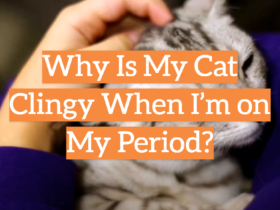
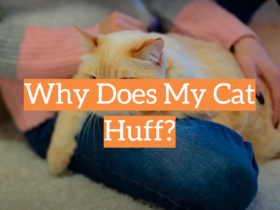
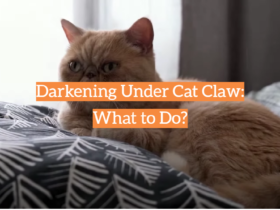
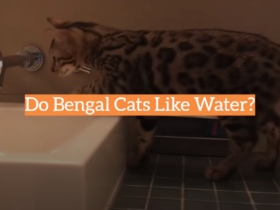
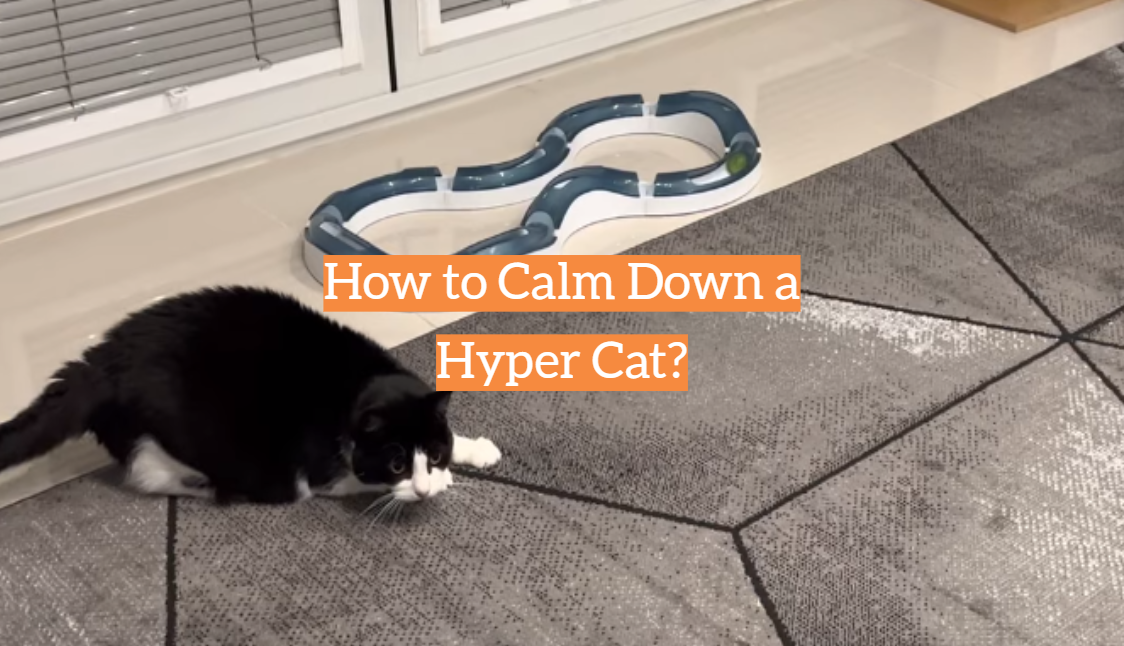
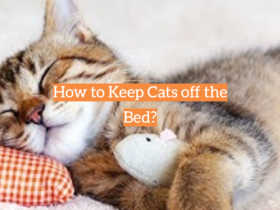

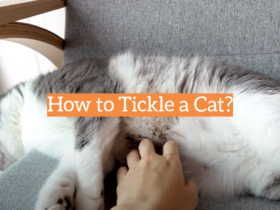
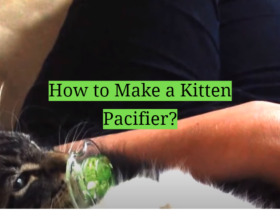
Leave a Reply